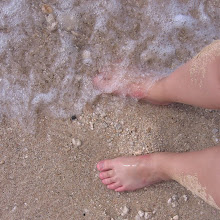I started by thinking about whether it might be helpful to address "chronic" and "pain" separately. My strategies for managing physical pain itself are pretty straightforward -- medication, visualization, rest, heat or ice, and, my personal favorites, distraction and denial. Because of the nature of pain, it's also helpful for me to remember that the body is interconnected -- and so sleep, massage, exercise, and a balanced diet can make a significant difference, even if they don't specifically "touch" the site of the pain. And because pain reverberates through and can be amplified by the whole self, pain management strategies also include things like getting fresh air, laughing, talking with friends, making cookies, or any of the other things that we might label "self-care." Beyond this, pain management also looks at prevention, stabilization, and, of course, addressing the root cause when possible.
Some of those strategies might be helpful in thinking about how to manage institutional pain (making cookies and hanging out with friends are two likely candidates, although "addressing the root cause" would be my personal preference). But I think that reflecting on the chronic nature of physical pain also gives us some important insights:
- Some days are going to be worse (or better) than others, and you can't always predict or explain why.
- Because the pain is ongoing, it's easy to forget to take care of it. Even if the pain today is the same as yesterday, it's still important to attend to it today.
- Yet because the pain is ongoing, the management strategies also need to take this into account. You can't make cookies every day -- well, you can, but it's not that healthy, and at some point it will stop feeling like a special treat.
- It's helpful (to me, at least) to remember that pain can serve a purpose -- it helps us avoid injury, or recognize when a situation needs to be changed. I wouldn't want a life without pain; this realization often helps me keep pain in perspective.
- The Serenity Prayer can be helpful here too. Chronic pain means accepting that pain is part of daily life, but that doesn't mean forgetting or letting go of what can be done to lessen the impact or treat the underlying cause.
One last thought. Elaine Scarry argues that pain "unmakes" us -- she describes (physical) pain as something that makes us focus inward, both because pain itself serves as a "blinder" to other experiences, and also because (she says) it cannot be articulated or shared with others. I disagree with her on some of these points, and wonder how the idea of institutional pain might disrupt her particularly individualistic interpretation of pain. Still, her notion of "unmaking" is intriguing to me. In particular, if we think of institutional pain as something that is collectively felt and might be collectively managed, I wonder what it means (or might mean) to experience that which unmakes us, institutionally and communally. If, at our school, we highlight the problematic aspects of systems and structures in ways that often amplify pain, how do we become more intentional about creating spaces for a productive communal "unmaking" that then allows for new life and new possibilities, while simultaneously offering resources for pain management? And, if we already do this in our classrooms, how do we then carry it into the rest of our institutional life?

This is such public space, but it is safe space for me to consider the following...please be gentle...
ReplyDeletei deal w/ pain. my pain is situated in memories. i just past my first yr anniversary of this particular pain, and now i'm told that i'm dealing w/ ptsd (as a result of this pain). this is emotional pain which sometimes manifests in physical pain: not sleeping, hyper-vigilance, etc. how can pain be transformative? if at all? am i able to manage this pain? i too am trying to manage it via meditation (i've not tried cookies, but perhaps i should) and other eastern ways.
how do we deal w/ pain that lives in the brain? lives in memories?